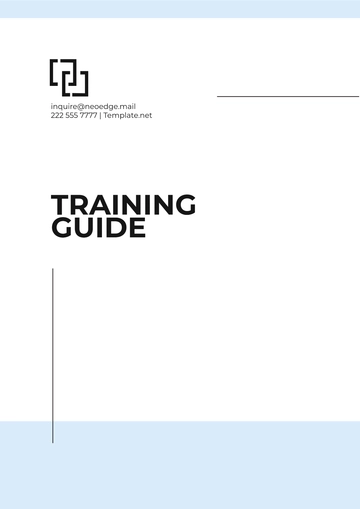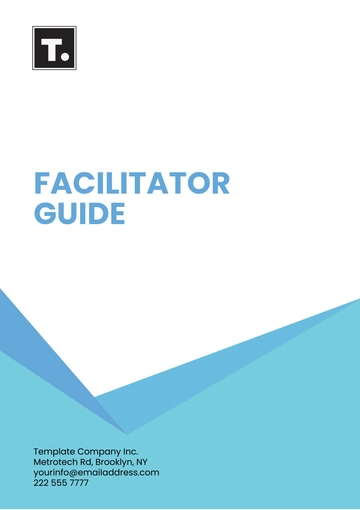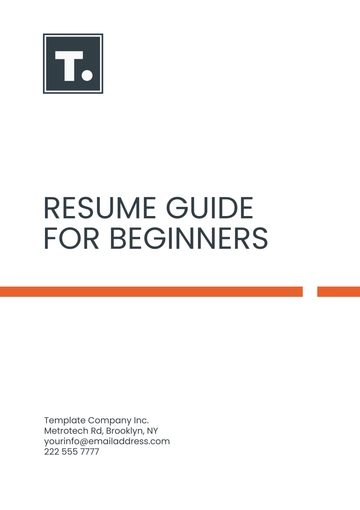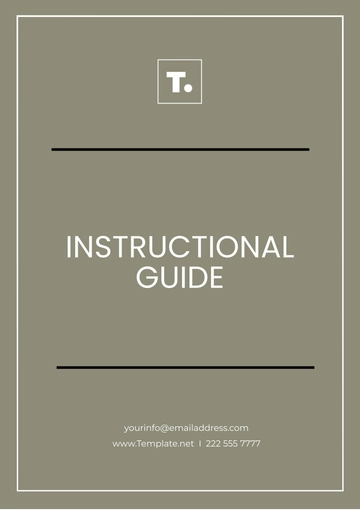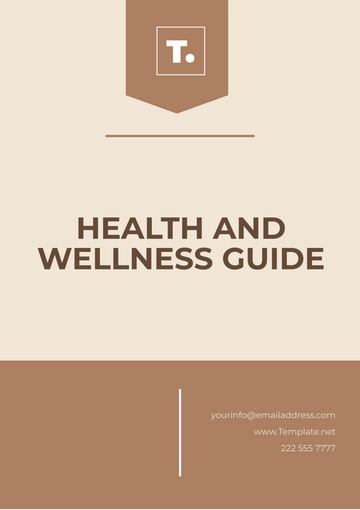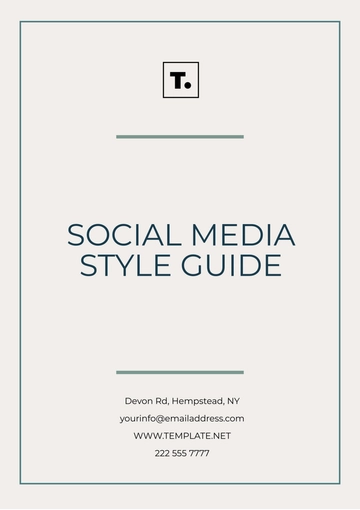Free School Health and Wellness Guide
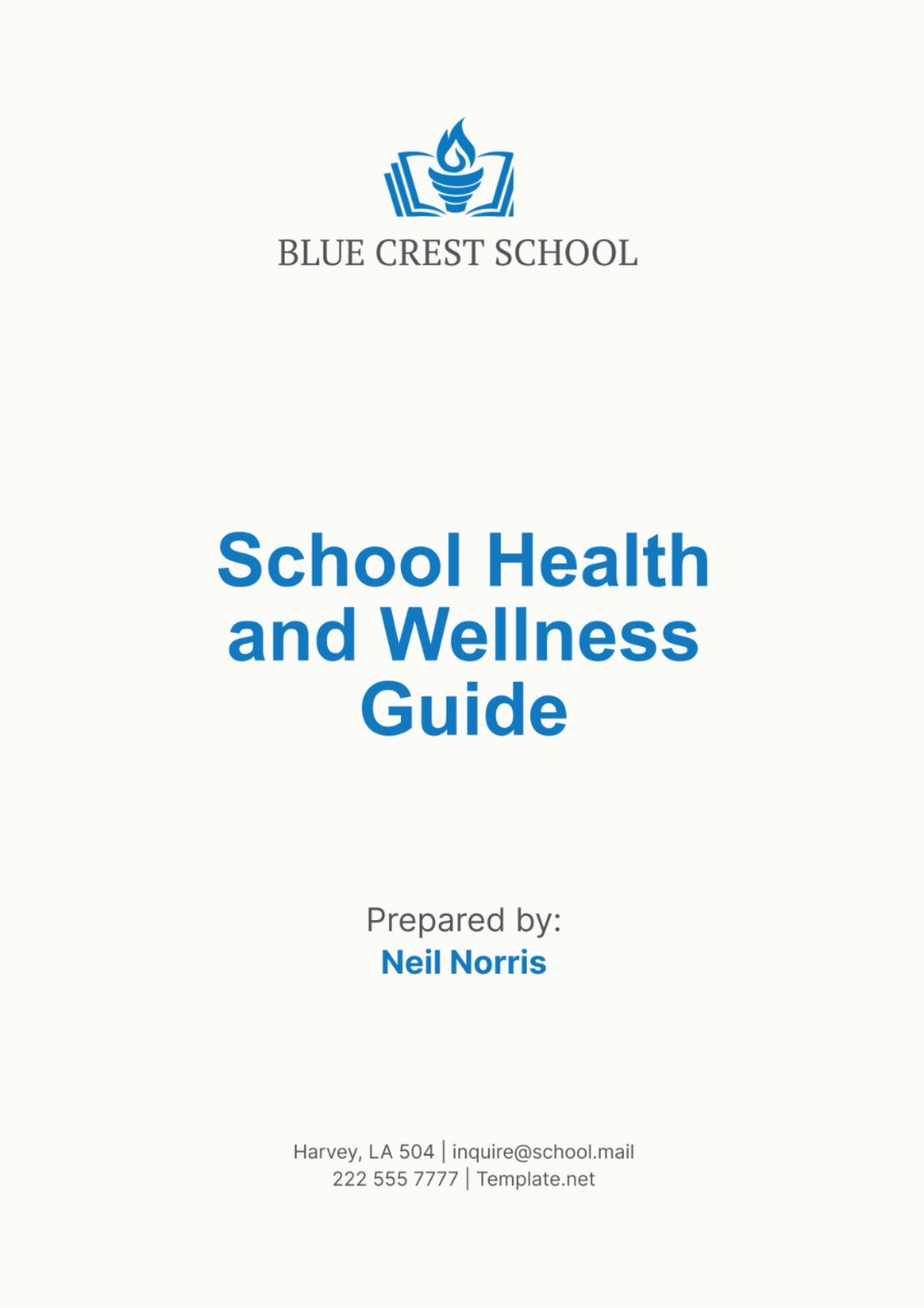
I. Introduction and Objectives
The School Health and Wellness Guide aims to promote a holistic approach to student wellness at [Your Company Name]. By focusing on daily physical activities, balanced nutrition, and mental health support services, we aim to enhance the overall well-being of our students.
Key Components:
Promoting Daily Physical Activities:
Encouraging students to participate in physical activities such as sports, yoga, and dance.
Providing access to sports facilities and equipment.
Integrating physical education into the curriculum.
Ensuring Balanced Nutrition:
Offering healthy meal options in school cafeterias.
Providing nutritional education to students and parents.
Ensuring compliance with nutritional standards and guidelines.
Providing Mental Health Support Services:
Offering counseling services for students facing mental health challenges.
Conducting stress management workshops and seminars.
Creating a supportive environment for students to discuss their mental health concerns.
II. Physical Activity and Fitness
Physical activity is vital for student health and well-being. At [Your Company Name], we prioritize daily physical activities and offer a variety of sports teams and fitness programs. From soccer to yoga, our programs are designed to promote physical fitness, teamwork, and sportsmanship. Students benefit from regular exercise, developing lifelong habits that contribute to their overall health.
A. Daily Physical Activities
Students are encouraged to engage in daily physical activities. Our school offers various options, including:
Activity Type | Description |
|---|---|
Sports Teams | Students can join sports teams based on their interests, including soccer, basketball, etc. Teams compete in inter-school tournaments, fostering teamwork and sportsmanship. Regular practice sessions are held to enhance skills and fitness levels. Coaches and trainers provide guidance on technique, strategy, and physical conditioning. Sports teams also serve as a platform for students to develop leadership skills and build lasting friendships with teammates. |
Fitness Classes | Regular fitness classes are conducted to promote physical activity among students. Classes include aerobic exercises, strength training, and flexibility exercises. Certified fitness instructors lead these classes, ensuring safe and effective workouts for students of all fitness levels. Fitness classes are designed to be engaging and enjoyable, encouraging students to develop a lifelong habit of staying active and healthy. |
Outdoor Activities | Outdoor activities such as nature walks, hiking, and outdoor games are organized regularly. These activities not only promote physical fitness but also provide students with opportunities to connect with nature and learn about the environment. Safety measures are implemented to ensure students' well-being during outdoor activities, with trained staff supervising the activities and providing guidance on outdoor safety. |
B. Sports and Fitness Programs
A variety of sports and fitness programs are available throughout the school year, including:
Program | Description |
|---|---|
Soccer | Soccer teams are available for both boys and girls, with regular practice sessions and matches. Coaches focus on developing players' skills, teamwork, and sportsmanship. Students have the opportunity to participate in inter-school competitions, enhancing their competitive spirit and sports experience. Soccer also promotes physical fitness, agility, and coordination among students. |
Basketball | Basketball teams participate in inter-school competitions and have regular training sessions. Coaches emphasize skill development, game strategies, and physical fitness. Students learn the importance of teamwork, discipline, and sportsmanship through their participation in the basketball program. Basketball also helps improve cardiovascular health, muscle strength, and overall fitness levels of students. |
Yoga | Yoga classes are offered to students to improve flexibility, strength, and mental well-being. Certified yoga instructors teach various yoga poses and breathing techniques suitable for students' age groups. Yoga sessions help reduce stress, improve concentration, and promote overall well-being among students. Yoga also teaches mindfulness and body awareness, which are beneficial for mental and emotional health. |
III. Nutrition and Healthy Eating
At [Your Company Name], we prioritize nutrition to support student health and well-being. Our nutritional guidelines emphasize balanced diets, whole foods, and limited sugary snacks. We ensure that our school cafeterias and snack programs adhere to these guidelines, offering nutritious meals, healthy snacks, and vegetarian and vegan options. By promoting healthy eating habits, we aim to instill lifelong wellness practices in our students.
A. Nutritional Guidelines
Our nutritional guidelines promote healthy eating habits. Key elements include:
Nutritional Element | Description |
|---|---|
Balanced Diets | Emphasis on balanced diets consisting of a variety of fruits, vegetables, whole grains, lean proteins, and healthy fats. Portions are controlled to ensure students receive adequate nutrition without overeating. The guidelines also recommend limiting the intake of saturated fats, trans fats, cholesterol, sodium, and added sugars. Students are encouraged to eat a variety of foods to ensure they receive all essential nutrients. |
Whole Foods | Preference for whole foods over processed foods. Whole foods are rich in nutrients and free from additives, providing students with optimal nutrition for their growth and development. The guidelines encourage the consumption of whole grains, such as brown rice and whole wheat bread, over refined grains. They also promote the consumption of fresh fruits and vegetables, lean meats, and low-fat dairy products. |
Limited Sugary Snacks | Limitation on sugary snacks and beverages. Instead, we encourage snacks that are low in added sugars and high in nutrients to support students' health and well-being. The guidelines recommend choosing fruits, vegetables, whole-grain snacks, and low-fat dairy products as healthier alternatives to sugary snacks. They also suggest limiting the consumption of sugary beverages, such as soda and sweetened fruit juices, and promoting water as the primary beverage choice. |
B. School Cafeteria and Snack Programs
We ensure that our school cafeterias and snack programs adhere to these nutritional guidelines, offering:
Program Component | Description |
|---|---|
Nutritious Meals | School cafeterias offer balanced and nutritious meals that meet or exceed national dietary guidelines. Meals include a variety of options to accommodate different dietary preferences and restrictions. Nutritious meals are prepared using fresh, locally sourced ingredients whenever possible, to ensure quality and freshness. The menus are designed by nutritionists to provide students with a well-balanced diet that meets their nutritional needs. |
Healthy Snacks | Snack programs provide healthy options such as fresh fruits, vegetables, whole-grain snacks, and low-fat dairy products. These snacks are available throughout the day to promote healthy eating habits. Snacks are portion-controlled to prevent overeating and ensure students receive the right amount of nutrients. Healthy snacks are also made available in vending machines and school stores to provide students with convenient options. |
Vegetarian and Vegan Options | In addition to traditional meal options, our cafeterias offer vegetarian and vegan options to cater to students with specific dietary preferences. These options are well-balanced and nutritionally adequate, providing students with diverse choices for their meals. Vegetarian and vegan options include plant-based proteins such as beans, lentils, tofu, and tempeh, as well as a variety of fruits, vegetables, and whole grains. |
IV. Mental Health and Emotional Well-being
At [Your Company Name], we prioritize the mental health and emotional well-being of our students. Our school provides access to counseling services, including individual counseling and group therapy sessions, to support students in managing their emotions and developing healthy coping strategies. Additionally, we offer stress management workshops that cover meditation and mindfulness, time management, and healthy coping mechanisms, empowering students to thrive both academically and personally.
A. Counseling Services
Our school provides access to counseling services for all students, including:
Service Type | Description |
|---|---|
Individual Counseling | Our school provides access to individual counseling sessions with trained counselors. These sessions offer a confidential and supportive environment for students to explore their thoughts and feelings. Counselors work collaboratively with students to identify and address issues such as anxiety, depression, relationship problems, and academic stress. They also help students develop coping strategies and enhance their problem-solving skills. |
Group Therapy Sessions | Group therapy sessions are available for students who may benefit from sharing their experiences with peers. Led by trained therapists, these sessions provide a supportive environment for students to discuss common issues, learn from each other, and practice new skills. Group therapy can help students feel less alone in their struggles and gain valuable insights and perspectives from others facing similar challenges. |
B. Stress Management Workshops
We offer stress management workshops that cover:
Workshop Topic | Description |
|---|---|
Meditation and Mindfulness | Workshops on meditation and mindfulness teach students techniques to manage stress and anxiety. Students learn to focus their attention on the present moment, cultivate a sense of calmness, and develop a greater awareness of their thoughts and feelings. These practices can help reduce symptoms of stress, improve mental clarity, and enhance overall well-being. |
Time Management | Time management workshops help students improve their organizational skills and reduce procrastination. Students learn effective strategies for setting priorities, creating schedules, and managing their time efficiently. By learning to manage their time effectively, students can reduce feelings of overwhelm and improve their ability to meet deadlines and achieve their goals. |
Healthy Coping Mechanisms | Workshops on healthy coping mechanisms teach students alternative ways to manage stress. These may include engaging in physical activity, practicing relaxation techniques, such as deep breathing or progressive muscle relaxation, engaging in creative activities, such as art or music, and seeking social support from friends, family, or school counselors. By learning healthy coping skills, students can reduce the negative impact of stress on their mental and emotional well-being. |
V. Health Screenings and Medical Services
At [Your Company Name], we prioritize the health and well-being of our students through regular health screenings and vaccinations. We conduct vision and hearing tests, dental check-ups, and general wellness exams to prevent illness and maintain a healthy school environment. Vaccinations are scheduled according to health authority guidelines, ensuring the safety and health of all students. These efforts contribute to a supportive and thriving learning environment for our students.
A. Regular Health Screenings
We conduct regular health screenings to prevent illness and maintain a healthy school environment:
Screening Type | Description |
|---|---|
Vision and Hearing Tests | We conduct regular vision and hearing tests to detect any issues early and ensure students have optimal sensory health. These screenings are essential for identifying potential problems that may affect learning and overall well-being. Our school nurse or healthcare provider administers these tests using specialized equipment, and results are shared with parents or guardians for further action if needed. |
Dental Check-ups | Regular dental check-ups are conducted to promote oral health and prevent dental issues. These check-ups include examinations for cavities, gum disease, and other dental problems, ensuring that students maintain good oral hygiene. Our school works closely with local dental professionals to provide these check-ups on-site or refer students to off-site dental clinics as needed. |
General Wellness Exams | General wellness exams are performed to assess students' overall health. These exams include measurements of height, weight, blood pressure, and other vital signs, as well as discussions about lifestyle habits and health concerns. Results of these exams are recorded in students' health records, which are kept confidential and accessible only to authorized personnel. |
B. Vaccinations
Vaccinations are scheduled according to the guidelines provided by health authorities to ensure the safety and health of all students. These vaccinations protect against serious diseases such as measles, mumps, rubella, polio, and tetanus, among others.
Vaccination schedules are communicated to parents and guardians to ensure compliance with health regulations. Our school works closely with local health departments to provide vaccination clinics on-site or refer students to off-site vaccination centers for administration.
Vaccination Type | Schedule |
|---|---|
Measles, Mumps, Rubella (MMR) | 2 doses: first dose at 12-15 months, second dose at 4-6 years. |
Polio | 4 doses: first dose at 2 months, second dose at 4 months, third dose at 6-18 months, fourth dose at 4-6 years. |
Tetanus, Diphtheria, Pertussis (Tdap) | Single dose at 11-12 years, with boosters every 10 years. |
Varicella (Chickenpox) | 2 doses: first dose at 12-15 months, second dose at 4-6 years. |
Hepatitis B | 3 doses: first dose at birth, second dose at 1-2 months, third dose at 6-18 months. |
Hepatitis A | 2 doses: first dose at 12-23 months, second dose at 6-18 months after the first dose. |
Human Papillomavirus (HPV) | 2 doses if started before age 15, 3 doses if started at or after age 15. |
Meningococcal | 2 doses: first dose at 11-12 years, second dose at 16 years. |
Influenza (Flu) | Yearly, starting at 6 months of age. |
Note: Vaccination schedules may vary based on local health authority guidelines and individual circumstances. Please consult with healthcare providers for specific recommendations.
VI. Parental Involvement and Education
At [Your Company Name], we believe that parental involvement is crucial for student success. We offer workshops to educate parents on health and wellness topics such as nutrition, mental health awareness, and promoting physical activity at home. Additionally, we foster a supportive community by providing volunteer opportunities, hosting parent-teacher meetings, and organizing community events. Together, we create a collaborative environment that nurtures the holistic development of our students.
A. Parental Workshops
We offer workshops for parents to educate them on health and wellness topics, including:
Workshop Topic | Description |
|---|---|
Nutrition and Meal Planning | Workshops on nutrition and meal planning educate parents about healthy eating habits for their children. Topics include the importance of balanced diets, meal preparation tips, and how to encourage children to make healthy food choices. |
Mental Health Awareness | These workshops raise awareness about mental health issues in children and adolescents. Parents learn about signs of mental health problems, how to support their child's emotional well-being, and when to seek professional help. |
Physical Activity at Home | Workshops on physical activity at home provide parents with ideas and strategies to keep their children active. These workshops emphasize the importance of regular physical activity for overall health and well-being. |
B. Community Support
Creating a supportive community is critical. We encourage parental involvement through:
Support Component | Description |
|---|---|
Volunteer Opportunities | We offer various volunteer opportunities for parents to get involved in school activities. This includes assisting with school events, participating in fundraising efforts, and volunteering in classrooms or school committees. |
Parent-Teacher Meetings | Regular parent-teacher meetings are held to discuss students' progress, academic performance, and any concerns. These meetings provide an opportunity for parents and teachers to collaborate in supporting students' learning and development. |
Community Events | Community events such as fairs, picnics, and cultural celebrations bring together parents, students, and staff. These events strengthen community bonds, promote cultural diversity, and create a sense of belonging among families. |
VII. Policies and Procedures
To ensure the well-being of our students, [Your Company Name] has implemented various policies and procedures related to health and wellness. These include attendance policies for health-related reasons, guidelines for sick days and medical absences, and procedures for handling mental health crises and emergency situations. These policies are designed to support the School Health and Wellness Guide and promote a safe and healthy environment for all students.
Policy / Procedure | Details |
|---|---|
Attendance Policies | Our attendance policies allow for excused absences due to health-related reasons. Students are required to provide a doctor's note for prolonged absences. We understand the importance of maintaining good health and encourage students to prioritize their well-being. In cases of chronic illness or other health conditions, individualized attendance plans may be developed in collaboration with parents and healthcare providers. These plans ensure that students receive the necessary support and accommodations to manage their health while maintaining academic progress. |
Guidelines for Sick Days | Students experiencing symptoms of illness are encouraged to stay home to prevent the spread of illness. Our guidelines outline when students should stay home, how to notify the school of an absence, and when it is safe to return to school. We emphasize the importance of rest and recovery to facilitate a quick return to health. In cases of prolonged illness, our school works with students and families to provide academic support and make accommodations as needed. |
Procedures for Medical Absences | For prolonged medical absences, students may be required to submit a medical certificate. This certificate should include the diagnosis, treatment plan, and expected duration of absence. Students are expected to make up missed work upon their return to school. Our school provides resources and support to help students reintegrate into the academic environment smoothly after a medical absence. |
Procedures for Mental Health Crises | In the event of a mental health crisis, students are encouraged to seek immediate help from a mental health professional. Our school counselors are available to provide support and guidance to students in crisis. Parents are notified promptly, and appropriate actions are taken to ensure the student's safety and well-being. We also provide training to staff to recognize the signs of mental health crises and respond appropriately to support students in distress. |
Emergency Situations | In emergency situations, our staff are trained to follow emergency protocols to ensure the safety of all students. This includes evacuations, lockdowns, and other emergency procedures. Regular drills are conducted to ensure that students and staff are prepared for emergencies. Our emergency response plans are reviewed and updated regularly to address new threats and ensure effectiveness in keeping our school community safe. |
For more information, contact:
[Your Name]
Email: [Your Email]
Phone: [Your Company Number]
- 100% Customizable, free editor
- Access 1 Million+ Templates, photo’s & graphics
- Download or share as a template
- Click and replace photos, graphics, text, backgrounds
- Resize, crop, AI write & more
- Access advanced editor
Discover the ultimate School Health and Wellness Guide Template on Template.net. This fully customizable template ensures you convey essential health information seamlessly. Easily editable, this guide covers all aspects of school wellness programs. Best of all, it's editable in our AI Editor Tool, offering flexibility and convenience to marketing professionals. Simplify your work and enhance your communication today!






